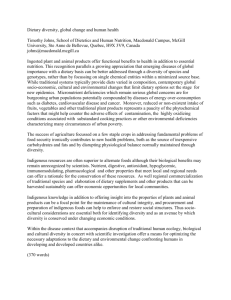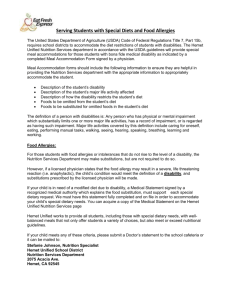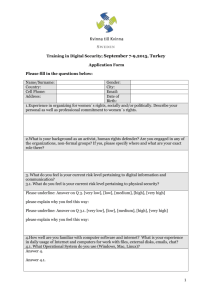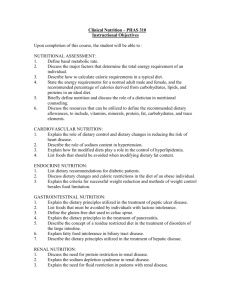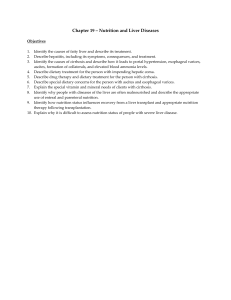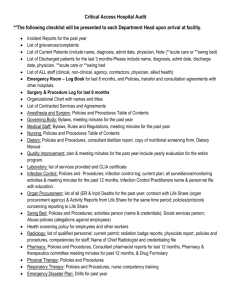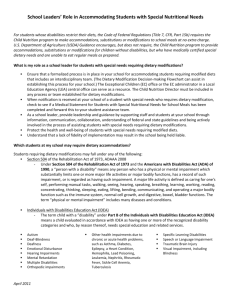Procedures for Prevention of Allergic Reaction to Children Sensitive
advertisement
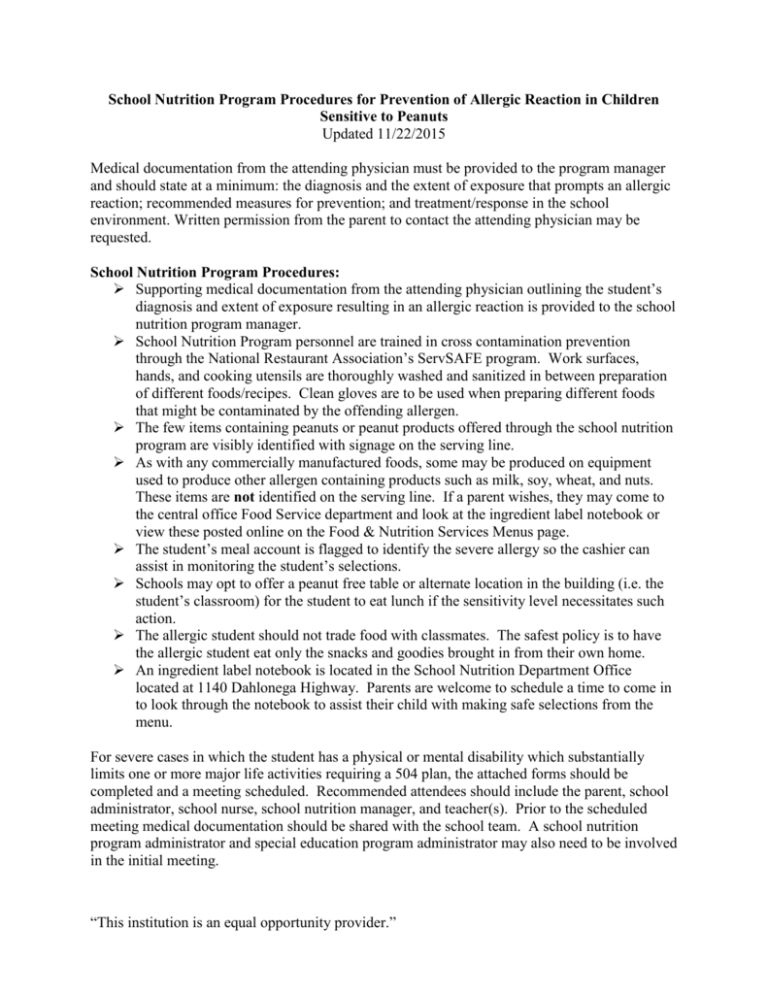
School Nutrition Program Procedures for Prevention of Allergic Reaction in Children Sensitive to Peanuts Updated 11/22/2015 Medical documentation from the attending physician must be provided to the program manager and should state at a minimum: the diagnosis and the extent of exposure that prompts an allergic reaction; recommended measures for prevention; and treatment/response in the school environment. Written permission from the parent to contact the attending physician may be requested. School Nutrition Program Procedures: Supporting medical documentation from the attending physician outlining the student’s diagnosis and extent of exposure resulting in an allergic reaction is provided to the school nutrition program manager. School Nutrition Program personnel are trained in cross contamination prevention through the National Restaurant Association’s ServSAFE program. Work surfaces, hands, and cooking utensils are thoroughly washed and sanitized in between preparation of different foods/recipes. Clean gloves are to be used when preparing different foods that might be contaminated by the offending allergen. The few items containing peanuts or peanut products offered through the school nutrition program are visibly identified with signage on the serving line. As with any commercially manufactured foods, some may be produced on equipment used to produce other allergen containing products such as milk, soy, wheat, and nuts. These items are not identified on the serving line. If a parent wishes, they may come to the central office Food Service department and look at the ingredient label notebook or view these posted online on the Food & Nutrition Services Menus page. The student’s meal account is flagged to identify the severe allergy so the cashier can assist in monitoring the student’s selections. Schools may opt to offer a peanut free table or alternate location in the building (i.e. the student’s classroom) for the student to eat lunch if the sensitivity level necessitates such action. The allergic student should not trade food with classmates. The safest policy is to have the allergic student eat only the snacks and goodies brought in from their own home. An ingredient label notebook is located in the School Nutrition Department Office located at 1140 Dahlonega Highway. Parents are welcome to schedule a time to come in to look through the notebook to assist their child with making safe selections from the menu. For severe cases in which the student has a physical or mental disability which substantially limits one or more major life activities requiring a 504 plan, the attached forms should be completed and a meeting scheduled. Recommended attendees should include the parent, school administrator, school nurse, school nutrition manager, and teacher(s). Prior to the scheduled meeting medical documentation should be shared with the school team. A school nutrition program administrator and special education program administrator may also need to be involved in the initial meeting. “This institution is an equal opportunity provider.” Accommodating Children with Special Dietary Needs in School Nutrition Programs Accommodating Students with Disabling Special Dietary Needs Schools participating in a federal Child Nutrition Program (School Lunch, School Breakfast or After School Snack Program) are required to make accommodations for children who are unable to eat the school meals because of a disability* that restricts their diet. In order to make modifications or substitutions to the school meal, schools must have a written Medical Statement on file that is signed by a licensed physician or other State licensed health care professional authorized to write medical prescriptions under State law. The statement must identify: The child’s disability An explanation of why the disability restricts the child’s diet The major life activity affected by the disability The food(s) to be omitted from the child’s diet The food or choice of foods that must be provided as the substitute *Only a physician can declare if a student has a disability. Accommodating Students with Non-Disabling Special Dietary Needs The school food authority may, at their discretion, make substitutions for students who have a special dietary need, but do not meet the definition of disability. Examples include food intolerances or allergies that do not cause life-threatening reactions. The decision to accommodate a student’s special dietary need can be determined on a case-by-case basis, however, the school should remain consistent with accommodating special dietary needs. In order to make modifications or substitutions to the school meal, schools must have a written Medical Statement signed by a recognized medical authority identifying the following: An identification of the medical or other special dietary condition which restricts the child’s diet The food or foods to be omitted from the child’s diet The food or choice of foods to be substituted In Georgia, a recognized medical authority includes a physician, physician assistant, and nurse practitioner. Special Needs regarding Milk for Students with Non-Disabling Special Dietary Needs For students with non-disabling special dietary needs which restrict their intake of fluid milk, the following applies. Parents/guardians or a recognized medical authority (physician, physician assistant, or nurse practitioner) may request in writing that a student not be required to take milk as part of a reimbursable school meal due to a nondisabling medical dietary need, such as milk intolerance, or due to cultural, religious or ethnic beliefs. The request must be made in writing must identify the student’s medical or special dietary need that prevents them from consuming cow’s milk. A “special dietary need” can refer to cultural, ethnic, religious needs, or medical needs. The Forsyth Co. School Nutrition Program does not have any nondairy, fluid milk beverage substitute that meets the required established nutrient standards, as indicated in Question 20 in USDA memo SP 07-2010, and the GaDOE SNP Criteria and Procedure MS-03-01: Fluid Milk Substitutions. Juice and water cannot be substituted for fluid milk as part of the reimbursable meal even when requested by a physician. Some schools may routinely offer fruit or vegetables juices on their menus as options for a fruit or vegetable choice. Fruit and/or vegetable juices cannot be offered in place of milk, but only as a fruit or vegetable choice for all students. All juice must be 100% full strength. Responsibility of Parents Notify the school of any food allergy, disability or special dietary need. Provide Medical Statement completed by a physician (disability), a recognized medical authority (non-disabling special dietary need), or the parent (non-disabling special dietary needs for milk only). Participate in any meetings or discussions regarding the student’s meal plan. Maintain a healthy line of communication with the school. “This institution is an equal opportunity provider.” Notify the school of any changes relating to the special dietary need (a new Medical Statement is required if the diet changes). School Nutrition Program Responsibility Provide food substitutions for students according to Medical Statement. The school food service staff may not revise or change a diet prescription or medical order. Provide training to cafeteria personnel on how to properly accommodate students with special dietary needs. Maintain documentation of this training. Communicate with parents, staff, and medical authorities regarding diet modifications. Maintain Medical Statement on each student with a special dietary need. Diet orders are not required to be renewed on a yearly basis, however, the Georgia Department of Education recommends that you confirm, on a yearly basis, the diet order has not changed. If there are any changes to the diet, a new Medical Statement is required. School Nurse Responsibility Collaborate with School Nutrition Program Director, school staff, parents, and physician to appropriately share pertinent information, obtain a copy of Medical Statement, and accommodate students with special dietary needs. Develop medical plan of care as appropriate (Individualized Healthcare Plan). Other Federal regulations Based upon Federal laws that prohibit discrimination and ensure equal access to education, some students may have instructions for accommodating their special need written into a 504 Plan or an Individualized Education Plan (IEP). Typically, a team consisting of the school professionals and the parents collaborate to develop these plans. If the 504 Plan or IEP involves special dietary needs, the school nutrition program director should be involved. Additional Resources: USDA's Accommodating Children with Special Dietary Needs in the School Nutrition Programs: http://www.fns.usda.gov/cnd/guidance/special_dietary_needs.pdf. USDA Memo SP 32-2015: Statements Supporting Accommodations for Children with Disabilities in the Child Nutrition Programs: http://www.fns.usda.gov/sites/default/files/cn/SP32_CACFP13_SFSP15-2015os.pdf Medical Association of Georgia. Georgia Prescribers Chart. http://www.mag.org/sites/default/files/downloads/georgia-prescribers-chart.pdf USDA Memo SP 36-2013: Guidance Related to the ADA Amendments Act http://www.fns.usda.gov/sites/default/files/SP36-2013os.pdf USDA Memo SP07-2010: Q & As: Milk Substitution for Children with Medical or Special Dietary Needs: http://www.fns.usda.gov/sites/default/files/SP_07_CACFP_04_SFSP_05-2010_os.pdf Food Allergy Research & Education: http://www.foodallergy.org/ Additional Contact Information: Contact the Georgia Department of Education, School Nutrition Division, with questions regarding accommodating students with special dietary needs in the School Meals Programs at 404-519-9210. “This institution is an equal opportunity provider.” Medical Plan of Care for School Nutrition Program (Students with Disabilities and Non-Disabling Special Dietary Needs) The following child is a participant in one of the United States Department of Agriculture (USDA) school nutrition programs. USDA regulations 7CFR Part 15B require substitutions or modifications in school nutrition program meals for children whose disability restricts their diet and is supported by a statement signed by a licensed physician or other State licensed health care professional authorized to write medical prescriptions under State law. Food allergies which may result in a severe, life-threatening (anaphylactic) reaction may meet the definition of “disability.” The school food authority may choose to accommodate a student with a non-disabling special dietary need that is supported by a statement signed by a recognized medical authority (physician, physician assistant or nurse practitioner). The school food authority may choose to make a milk substitution available for students with a non-disabling special dietary need, such as milk intolerance or for cultural or religious beliefs. If the school food authority makes these substitutions available, the milk substitute must meet nutrient standards identified in regulations. If available, this will be indicated in Part 2. A parent/guardian or recognized medical authority (physician, physician assistant, or nurse practitioner) may complete this section. If this is the only substitution being requested, complete Part 1 and 2 only. Part 1: To be completed by Parent/Guardian (all requests for special dietary needs) Child’s Name Date of Birth Name of School/Center/Program Grade Level/Classroom Parent’s/Guardian’s Name Address, City, State, Zip Code ([ ]) ([ Home Phone M F ]) Work Phone Part 2: Non-disabling special dietary needs only regarding Milk School/school district does not have milk substitutes available to students with non-disabling special dietary needs. Water is available for all students. Does the child have a non-disabling medical or special dietary need that restricts intake of fluid milk? List medical or special dietary need (e.g., lactose intolerance or for cultural or religious beliefs): Yes No Medical Authority or Parent/Guardian Signature:__________________________________________ Date:_____________ Part 3: To be completed by Physician/Medical Authority Disability/Special Dietary Needs Does the child have a disability? Yes No If Yes, please identify the disability and describe the major life activities affected by the disability. Does the child’s disability affect their nutritional or feeding needs? Yes No If the child does not have a disability*, does the child have special nutritional or feeding needs? Yes No (*These accommodations are optional for schools to make) If Yes, please identify the medical or other special dietary condition which restricts the diet. If the child has a disability or special dietary/feeding need, please complete Part 4 of this form and have it signed and stamped with the office name and address of a licensed physician/recognized medical authority. “This institution is an equal opportunity provider.” Part 4: To be completed by Physician/Medical Authority Diet Order List any dietary restrictions, such as food allergies or intolerances (list all specific foods to be omitted): List specific foods to be substituted (substitution cannot be made unless section is completed): List foods that need the following change in texture. If all foods need to be prepared in this manner, indicate “All.” Cut up/chopped into bite sized pieces: Finely Ground: Pureed: List any special equipment or utensils needed: Indicate any other comments about the child’s eating or feeding patterns: Physician/Medical Authority Printed Name and Office Phone Number Address or Office Stamp Physician/Medical Authority’s Signature Date Part 5: Parent Signature Date Part 6: School Nutrition Program Director Signature Date Health Insurance Portability and Accountability Act Waiver In accordance with the provisions of the Health Insurance Portability and Accountability Act of 1996 and the Family Educational Rights and Privacy Act, I hereby authorize _________________________________ (medical authority) to release such protected health information of my child as is necessary for the specific purpose of Special Diet information to _________________________________________ (school/program) and I consent to allow the physician/medical authority to freely exchange the information listed on this form and in their records concerning my child with the school program as necessary. I understand that I may refuse to sign this authorization without impact on the eligibility of my request for a special diet for my child. I understand that permission to release this information may be rescinded at any time except when the information has already been released. My permission to release this information will expire on __________________ (date). This information is to be released for the specific purpose of Special Diet information. The undersigned certifies that he/she is the parent, guardian or official representative of the person listed on this document and has the legal authority to sign on behalf of that person. Parent/Guardian Signature:________________________________________________ Date:______________________ (Signing this section is optional, but may prevent delays by allowing us to speak with the physician) “This institution is an equal opportunity provider.” Please have parent/guardian review form annually and initial/date if no changes are required. Any changes require submission of a new form signed by the Physician/Medical Authority. Parent confirmed no change in diet order. ____ Date ________ ____ Date________ ____ Date ________ ____ Date _______ ____ Date ________ ____ Date________ ____ Date ________ ____ Date_______ A copy of this form should be kept by the School Nutrition Manager and the Nurse. FERPA allows school nurses to share student’s medical information regarding dietary needs with school nutrition services. “This institution is an equal opportunity provider.”


